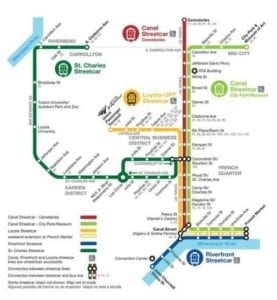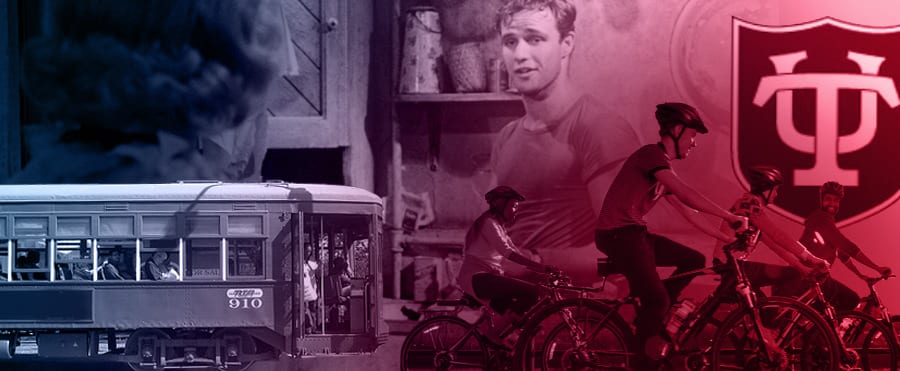At the beginning of the famous play and film, A Streetcar Named Desire, the fictional Blanche DuBois arrives in New Orleans with instructions to take the streetcar named “Desire” to her sister’s home. The rest is theatrical and cinematic history.
Our TDM team couldn’t help using the famous “Streetcar” title in our own article headline to highlight the efforts of New Orleans’ Tulane University to create a sustainable transportation culture and student life experience using TDM tools, even if there isn’t much real correlation between TDM and Tennessee Williams’ famous play. In reality, the outcome of Tulane’s TDM efforts is a bit more upbeat than the play!
Tulane, Streetcar Transit, and TDM Culture

If Transportation Demand Management can be summed up as “Don’t expand the existing vehicle transportation infrastructure” and “Integrate more transportation choices,” then Tulane offers many examples of how to do it right. And that starts with transit.
While there actually is a “Cemeteries” streetcar stop in New Orleans (which calls to mind Tennessee Williams’ fictional “Cemeteries” streetcar line), Tulane students are more likely to take the St. Charles Streetcar which runs past the uptown campus toward the city’s famed French Quarter.
In addition to Tulane’s transit culture, two general initiatives at Tulane illustrate the university’s successes in improving transportation and livability while creating a more sustainable environment: the university’s Climate Action Plan and its efforts that have earned Tulane a Silver sustainability rating. These are things that our University Transportation team loves to geek out on.
Note: If you are interested in learning more about Tulane’s TDM efforts, make sure to sign up for the ACT Conference Sponsored Tulane Tour.
TDM Aspects of Tulane’s Climate Action Plan
Tulane’s climate action plan (CAP) places significant emphasis on TDM programs in order to reduce the university’s carbon footprint over the next few decades. Going back to 2014, the university’s climate action working group considered scenarios and recommendations relating to both the uptown and downtown campuses.
The path forward includes a number of steps that TDM practitioners will be familiar with. One tactic is an investment in commuter programs in order to reduce reliance on single occupancy vehicle (SOV) commuting. These initiatives include incentives to take transit such as paid passes and rides; additional shuttle service; commuter incentives and marketing; and adding additional bike infrastructure. Depending on the investment that is made over time, the university projects SOV reductions of between 10 and 50 percent.
You can get a more detailed idea of Tulane’s CAP plan and scenarios here.
University TDM Efforts Lead to Silver Sustainability Rating
Tulane University is a Silver-rated member of the Sustainability Tracking, Assessment & Rating System (STARS), which is a transparent, self-reporting framework managed by the Association for the Advancement of Sustainability in Higher Education (AASHE) for colleges and universities to measure their sustainability performance.
A portion of Tulane’s Silver rating can be directly attributed to a number TDM programs they offer on campus. In addition to electric vehicle recharging stations and short-term bicycle parking, these include:
- Bicycle Facilities: secure bicycle storage, shower facilities, and lockers for bicycle commuters – Tulane’s bike racks are distributed throughout campus for students to lock up and store their bikes. Shower facilities are available at the Reily Recreation Center and several academic buildings for students and faculty who choose to bike to the university. This bike culture spreads to transit: with bike racks on the front of New Orleans buses, students can bike to the bus or bus home from a bike ride
- Transit Passes/Free Shuttles: In addition to shuttles to shopping and entertainment sites, the Tulane University Shuttles and Transportation system provides over 250,000 rides every year to the university community between the uptown, health sciences, and university square campuses.
- Car Sharing: Via the university’s membership-based car sharing program, a number of Toyota Prius hybrids are available to students and employees. Members of this service can reserve cars online and rent them by the hour or day.

